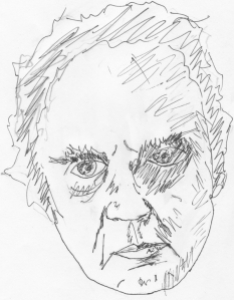BOOK | FICTION | LITERATURE
SUPER SAD TRUE LOVE STORY
by Gary Shteyngart
RATING: ★ ★ ★

In Gary Shteyngart’s SUPER SAD TRUE LOVE STORY, the state of the union is dire. The country is bankrupt and so are its morals and values. It is at war both abroad and at home with itself. Its fall from grace and global dominance is near complete. Its citizens are vacuous, intellectually dead, and have ceded their free will and persona’s to ubiquitous technological devices and the killer apps that power them.
While this may sound like a description of the America of today with its battered and disaffected citizenry, insane debt and out of control spending, and an even more insane and dysfunctional political environment that is preventing any type of resolution to any of its problems, we don’t know exactly when all of this is happening except that it is sometime in the near future.
Within the midst of this dystopian future is love-stricken Lenny, a shlumpy, less-than handsome, middle-aged romantic, first generation Russian, lover of his past-its-prime-and-glory city, who still reads those anachronistic, smelly pressed wood pulp things with ink-stained letters called books, attempting to court Eunice, a vibrant, young, superficial first generation Korean beauty who is repulsed by nearly everything about Lenny–he is old, naïve and weak, he has the face of a battleship, and the smell of his dirty old books make her ill–and who consumes her time and mind by shopping and live streaming on her all-consuming apparat.
Theirs is an unstable and unbalanced love affair that seems destined to collapse, as does just about everything important in Lenny’s life: we see America’s empire collapsing and the corpornation of China’s rising; we see the rule of law collapsing in his city as contractor military forces impose martial law in an effort to contain and control veterans returning from the war with Venezuela who are protesting and plotting against what’s left of the government because they have not received their promised combat pay; we see the collapse of his professional a life because he, a man more comfortable in second hand clothes and who still enjoys long, slow walks through Central Park, just cannot meet the rigors and sales quotas associated with having to sell Kurzweilian-like, eternal life plans to rich elites. Things look pretty grim for poor Lenny.
Things look grim because Super Sad True Love Story is a grim, despondent story; but fortunately for us, the readers, Shteyngart is a talented writer who tells the story in clever, humorous ways that take some of the sting out of its biting, bitter message…but not all of it.
I recommend you read Super Sad True Love Story, if not for its creative, literary value, then for its glimpse into what might become if we don’t soon figure out a way to work together in a common interest of saving our country from becoming a super sad true story of collapse and ruin.
~~~~





